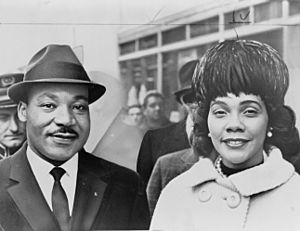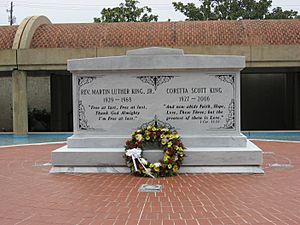Coretta Scott King facts for kids
Quick facts for kids
Coretta Scott King
|
|
|---|---|
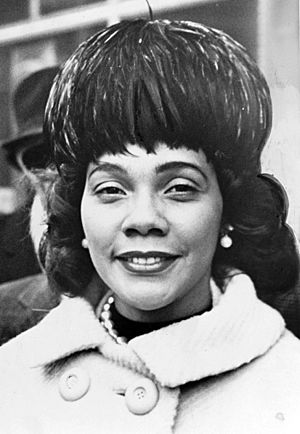
King in 1964
|
|
| Born |
Coretta Scott
April 27, 1927 Heiberger, Alabama, U.S.
|
| Died | January 30, 2006 (aged 78) Rosarito, Baja California, Mexico
|
| Resting place | King Center for Nonviolent Social Change |
| Education | Antioch College (BA) New England Conservatory of Music (BM) |
| Occupation |
|
| Political party | Democratic |
| Spouse(s) | |
| Children | |
| Relatives | Yolanda Renee King (granddaughter) Alveda King (niece) |
| Awards | Gandhi Peace Prize |
Coretta Scott King (née Scott; April 27, 1927 – January 30, 2006) was an American author, activist, and civil rights leader and the wife of Martin Luther King Jr.. King was also a singer who often incorporated music into her civil rights work.
Her work extended far beyond her husband's lifetime, and she left a lasting legacy that continues to inspire people around the world.
Contents
Early life and education
Coretta Scott was born on April 27, 1927, in Heiberger, Alabama. She was the third of four children of Obadiah Scott (1899–1998) and Bernice McMurry Scott (1904–1996). Coretta's mother was known for her musical talent and singing voice.
Obie, Coretta's father, was one of the first black people in their town to own a vehicle. Before starting his own businesses, he worked as a policeman. Along with his wife, he ran a clothing shop far from their home and later opened a general store. He also owned a lumber mill, which was burned down by white neighbors after Scott refused to sell his mill to a white logger.
At age 10, Coretta worked to increase the family's income. The Scott family had owned a farm since the American Civil War, but were not particularly wealthy. During the Great Depression the Scott children picked cotton to help earn money and shared a bedroom with their parents.
Her brother Obadiah thought she always "tried to excel in everything she did." Her sister Edythe believed her personality was like that of their grandmother Cora McLaughlin Scott, after whom she was named. Though lacking formal education themselves, Coretta Scott's parents intended for all of their children to be educated. Coretta quoted her mother as having said, "My children are going to college, even if it means I only have but one dress to put on."
The Scott children attended a one-room elementary school 5 miles (8 km) from their home and were later bused to Lincoln Normal School.
Coretta was a bright and talented student. She excelled in school and developed a love for music. She learned to play the piano and sang in the church choir. Her musical talents earned her a scholarship to Antioch College in Yellow Springs, Ohio, where she studied music and education.
At Antioch, Coretta became involved in the civil rights movement. She joined the college's Race Relations Committee and participated in protests against segregation. She also became interested in pacifism, the belief that conflicts should be resolved peacefully.
After graduating from Antioch, Coretta moved to Boston, Massachusetts, to study voice at the New England Conservatory of Music. She hoped to become a concert singer. It was in Boston that she met Martin Luther King Jr., who was studying theology at Boston University.
Meeting Martin Luther King Jr.
Coretta and Martin met in 1952. Two weeks after meeting Scott, King wrote to his mother that he had met his wife. On Valentine's Day 1953, the couple announced their plans to marry in the Atlanta Daily World. They were married on June 18, 1953.
Civil rights movement
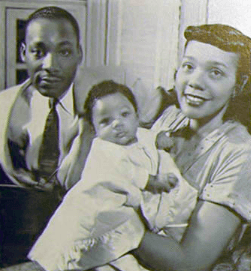
After their marriage, Coretta and Martin moved to Montgomery, Alabama, where Martin became the pastor of the Dexter Avenue Baptist Church. It was in Montgomery that they became deeply involved in the civil rights movement.
In 1955, Rosa Parks, a Black woman, was arrested for refusing to give up her seat on a bus to a white passenger. This act of defiance sparked the Montgomery Bus Boycott, a year-long protest in which Black residents refused to ride the city's buses. Martin Luther King Jr. emerged as the leader of the boycott, and Coretta played a crucial role in supporting him.
Coretta was not just Martin's wife; she was his partner in the struggle for civil rights. She helped him organize meetings, write speeches, and raise money for the movement. She also faced threats because of her involvement.
Throughout the 1950s and 1960s, Coretta and Martin worked tirelessly to end segregation and discrimination. They participated in marches, sit-ins, and other forms of nonviolent protest. They were arrested and jailed multiple times, but they never gave up their fight for justice.
Activism
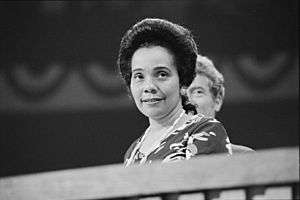
Coretta Scott King was not only a champion for civil rights but also a passionate advocate for peace. She believed that violence was never the answer and that conflicts should be resolved through dialogue and understanding.
During the Vietnam War, Coretta spoke out against the war and called for peace. She believed that the war was unjust and that it was diverting resources away from important domestic programs.
After Martin Luther King Jr.'s assassination in 1968, Coretta continued to work for peace and justice. She traveled the world, speaking out against oppression and violence. She met with world leaders and urged them to find peaceful solutions to conflicts.
Continuing Martin's legacy
After Martin Luther King Jr.'s death, Coretta dedicated her life to preserving his legacy and continuing his work. She founded the Martin Luther King Jr. Center for Nonviolent Social Change in Atlanta, Georgia. The King Center is a museum, archive, and educational center that promotes the principles of nonviolence and social justice.
Coretta also worked to establish Martin Luther King Jr. Day as a national holiday. After years of campaigning, the holiday was finally signed into law in 1983. Martin Luther King Jr. Day is now celebrated every year on the third Monday of January.
Later life and death
In her later years, Coretta Scott King continued to be a voice for peace and justice. She spoke out against racism, poverty, and war.
In August 2005, King suffered a stroke which paralyzed her right side and left her unable to speak; five months later, she died of respiratory failure due to complications from ovarian cancer. Her funeral was attended by some 10,000 people, including U.S. presidents George W. Bush, Bill Clinton, George H. W. Bush and Jimmy Carter.
She was temporarily buried on the grounds of the King Center until being interred next to her husband. She was inducted into the Alabama Women's Hall of Fame, the National Women's Hall of Fame, and was the first African American to lie in state at the Georgia State Capitol.
Timeline
- 1927: Born on April 27 in Heiberger, Alabama.
- 1945: Graduates as valedictorian from Lincoln High School.
- 1949: Graduates from Antioch College with a degree in music and education.
- 1951: Enrolls at the New England Conservatory of Music in Boston.
- 1952: Meets Martin Luther King Jr. in Boston.
- 1953: Marries Martin Luther King Jr. on June 18.
- 1954: The Kings move to Montgomery, Alabama, where Martin becomes pastor of Dexter Avenue Baptist Church.
- 1955: Montgomery Bus Boycott begins after Rosa Parks' arrest.
- 1957: First child, Yolanda Denise King, is born.
- 1959: Second child, Martin Luther King III, is born.
- 1961: Third child, Dexter Scott King, is born.
- 1963: Fourth child, Bernice Albertine King, is born.
- 1968: Martin Luther King Jr. is assassinated on April 4.
- 1969: Coretta Scott King establishes the Martin Luther King Jr. Center for Nonviolent Social Change (The King Center) in Atlanta.
- 1983: Martin Luther King Jr. Day is established as a U.S. federal holiday.
- 1994: Receives the Gandhi Peace Prize.
- 2004: Inducted into the National Women's Hall of Fame.
- 2006: Dies on January 30 in Rosarito Beach, Mexico, at the age of 78.
Interesting facts about Coretta Scott King
- King has been referred to as "First Lady of the Civil Rights Movement".
- Coretta described herself as a tomboy as a child, primarily because she could climb trees and recalled wrestling boys.
- When Coretta first met Martin Luther King Jr., she was surprised by how short he was.
- In January 1969, King was awarded the Universal Love Award. King became the first non-Italian to receive the award.
- She published her memoirs, My Life with Martin Luther King, Jr., in 1969.
Coretta Scott King quotes
- "There is a spirit and a need and a man at the beginning of every great human advance. Every one of these must be right for that particular moment of history, or nothing happens."
- "If you use weapons of war to bring about peace, you're going to have more war and destruction."
- "Struggle is a never ending process. Freedom is never really won, you earn it and win it in every generation."
- "If you don't use your power for positive change, you are, indeed, part of the problem."
Legacy
Coretta was viewed during her lifetime and posthumously as having strived to preserve her husband's legacy. The King Center, which she created the year of his assassination, allowed her husband's tomb to be memorialized.
Coretta is seen as being primarily responsible for the creation of the federal Martin Luther King Jr. Day. The holiday is now observed in all fifty states and has been since 2000.
Portrayals in film
- Cicely Tyson, in the 1978 television miniseries King
- Angela Bassett, in the 2013 television movie Betty and Coretta
- Carmen Ejogo played Coretta King in both the 2001 HBO film Boycott and the 2014 film Selma.
Recognition and tributes
Coretta Scott King was the recipient of various honors and tributes both before and after her death. She received honorary degrees from many institutions, including Princeton University, Duke University, and Bates College. She was honored by both of her alma maters in 2004, receiving a Horace Mann Award from Antioch College and an Outstanding Alumni Award from the New England Conservatory of Music.
In 1970, the American Library Association began awarding a medal named for Coretta Scott King to outstanding African-American writers and illustrators of children's literature.
In 1978, Women's Way awarded King with their first Lucretia Mott Award for showing a dedication to the advancement of women and justice similar to Lucretia Mott's.
Many individuals and organizations paid tribute to Scott King following her death, including U.S. President George W. Bush, the National Gay and Lesbian Task Force, the Human Rights Campaign, the National Black Justice Coalition, and her alma mater Antioch College.
In 1983 she received the Four Freedoms Award for the Freedom of Worship. She received the Key of Life award from the NAACP. In 1987 she received a Candace Award for Distinguished Service from the National Coalition of 100 Black Women.
In 1997, Coretta Scott King was the recipient of the Golden Plate Award of the American Academy of Achievement.
In 2004, Coretta Scott King was awarded the prestigious Gandhi Peace Prize by the Government of India.
In 2006, the Jewish National Fund, the organization that works to plant trees in Israel, announced the creation of the Coretta Scott King forest in the Galilee region of Northern Israel, with the purpose of "perpetuating her memory of equality and peace", as well as the work of her husband.
In 2007, The Coretta Scott King Young Women's Leadership Academy (CSKYWLA) was opened in Atlanta, Georgia. At its inception, the school served girls in grade 6 with plans for expansion to grade 12 by 2014. CSKYWLA is a public school in the Atlanta Public Schools system. Among the staff and students, the acronym for the school's name, CSKYWLA (pronounced "see-skee-WAH-lah"), has been coined as a protologism to which this definition has given – "to be empowered by scholarship, non-violence, and social change." That year was also the first observance of Martin Luther King Jr. Day following her death, and she was also honored.
Super Bowl XL was dedicated to King and Rosa Parks. Both were memorialized with a moment of silence during the pregame ceremonies. The children of both Parks and King then helped Tom Brady with the ceremonial coin toss. In addition two choirs representing the states of Georgia (King's home state) and Alabama (Park's home state) accompanied Dr. John, Aretha Franklin and Aaron Neville in the singing of the National Anthem.
She was inducted into the Alabama Women's Hall of Fame in 2009. She was inducted into the National Women's Hall of Fame in 2011.
In January 2023, The Embrace was unveiled in Boston; this sculpture commemorates Martin Luther King Jr. and Coretta Scott King, and depicts four intertwined arms, representing the hug they shared after he was awarded the Nobel Peace Prize in 1964.
Congressional resolutions
Upon the news of her death, moments of reflection, remembrance, and mourning began around the world. In the United States Senate, Majority Leader Bill Frist presented Senate Resolution 362 on behalf of all U.S. Senators, with the afternoon hours filled with respectful tributes throughout the U.S. Capitol.
On August 31, 2006, following a moment of silence in memoriam of the death of Coretta Scott King, the United States House of Representatives presented House Resolution 655 in honor of her legacy. In an unusual action, the resolution included a grace period of five days in which further comments could be added to it.
Images for kids
-
Coretta Scott with her husband and Vice President-elect Hubert Humphrey on December 17, 1964
-
King comforting daughter Bernice at her husband's funeral, in a Pulitzer Prize-winning photo by Moneta Sleet Jr.
-
Coretta Scott attends the signing of Martin Luther King Jr. Day by President Ronald Reagan on November 2, 1983
See also
 In Spanish: Coretta Scott King para niños
In Spanish: Coretta Scott King para niños
- List of civil rights leaders
- List of peace activists


